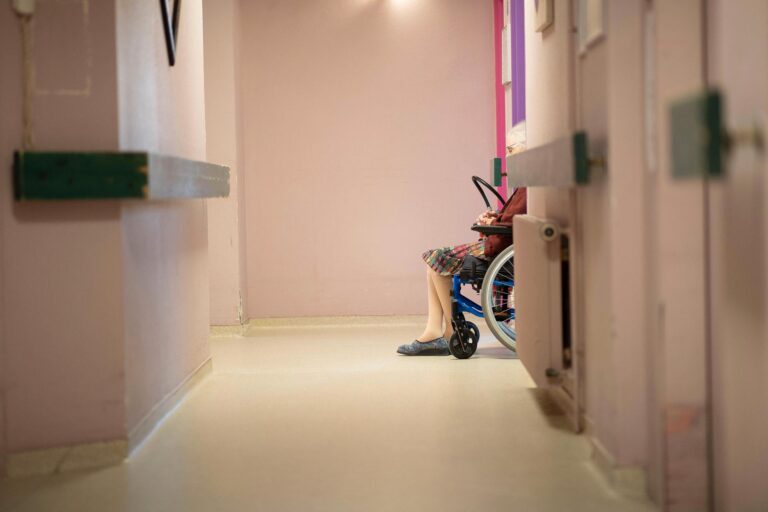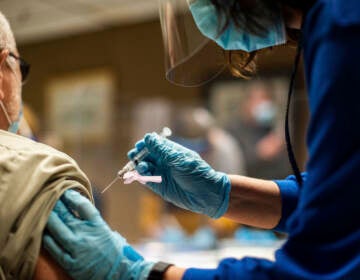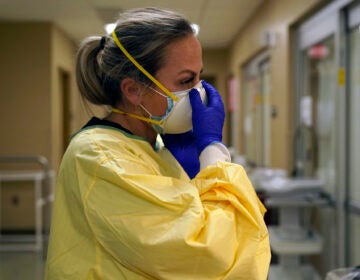Vaccines blunted COVID-19 inside N.J. nursing homes. Delta changed that
Cases have been rising steadily in long-term care facilities since the variant became prevalent despite widespread vaccine use.

File photo: A resident is pictured using a wheelchair inside a nursing home. (Jean-Francois Badias/AP)
This story originally appeared on NJ Spotlight.
Nursing homes in New Jersey and nationwide are experiencing a rising number of COVID-19 outbreaks due to the highly infectious delta variant, despite the growing use of coronavirus vaccines among previously hesitant staff.
But there seems little appetite for reinstating the lockdown measures employed during much of the pandemic, like restricting residents to their rooms and suspending visits. Instead, state officials, industry leaders and others are pushing to further boost immunization rates in these facilities, while continuing to enforce strict infection-control protocols to reduce the virus’s spread.
Nursing homes — once the epicenter of the pandemic in New Jersey — reported infection levels began to decline quickly last winter, once vaccines were widely available to residents and staff. That trend continued through this spring, mirroring the virus’s impact on the community at large. In May state regulators allowed family and friends to visit residents again, albeit with masking and other protocols, particularly when the individuals involved are not immunized.
But the expanding presence of the delta variant — which spreads twice as effectively as the original form of the virus — recently changed the trajectory of the disease in long-term care facilities. National nursing-home data indicates a low point for new cases among residents and staff in mid- to late June, but diagnoses have escalated quickly since then. By the week ending July 18, the most recent for which figures are available, cases among residents had grown 124% and staff cases increased 184% over three weeks.
Outbreaks doubled in recent weeks
In New Jersey, the number of long-term care facilities with active COVID-19 outbreaks more than doubled in recent weeks, according to state Department of Health records. By Friday, 49 nursing home or assisted living sites were reporting cases, compared to just 18 in mid-July. While almost all the facilities with current outbreaks reported only a handful of active staff or resident cases on Friday, one nursing home is the site of nearly three dozen new diagnoses among residents. Statewide there were 108 cases among residents and 92 positive diagnoses among staff.
“We know that congregate settings such as long-term care facilities are at greater risk for COVID-19 infections,” DOH Commissioner Judy Persichilli said last week, when she and Gov. Phil Murphy announced a new policy that requires corrections and health care workers — including those in long-term care — to get vaccinated by Sept. 7 or submit to coronavirus testing at least once a week. She called the mandate “an important step to reduce the risk to nursing home residents, hospitalized patients, and vulnerable New Jerseyans overall.”
Almost nine in 10 residents in New Jersey’s long-term care facilities have been fully vaccinated against COVID-19, according to the state, and nearly 72% of staff. But the workforce protection is far from even, as some facilities report inoculating as few as one in five employees, while others said every staff member received their coronavirus shots. Public health leaders insist more must be done to drive up immunization rates at these sites and are hopeful the new state policy will help.
“Health care workers can’t be a vector for a transmittable disease when there is quite a safe prevention for it,” said Stephen Crystal, a research professor, expert in aging and director of Rutgers University’s Center for Health Services. Taking responsibility to protect patients, “that’s part of being a health care worker,” he said.
Crystal favors even stronger COVID-19 vaccination mandates for frontline health care workers, like those adopted by a growing number of individual hospital systems in New Jersey and New York. He said he’d rather see state and industry officials push to inoculate as many people as quickly as possible, instead of a return to nursing home lockdowns.
Vulnerable residents
“We have a choice,” Crystal said of vaccination policy in general. “You put in some requirements which move enough people off the fence, or you wait until enough people get sick and (staff feel compelled) to do it on their own,” he said, noting the second option leaves more vulnerable residents exposed.
While some nursing homes, including a national group of 5,000 nonprofit facilities, have opted for vaccination mandates, industry leaders and worker unions have generally opposed such strict measures. Labor leaders in New Jersey and the Health Care Association of New Jersey, which represents the long-term care industry, did support Murphy’s shot-or-test policy.
“We want everybody to get vaccinated” in long-term care, said HCANJ’s president and CEO, Andy Aronson. “But when you have community spread it’s going to come into our buildings,” he said. “If there is one correlation we’ve seen repeatedly with COVID it’s that when community cases rise, long-term care cases rise.”
In New Jersey new COVID-19 diagnoses among the public increased roughly fivefold since early July, state data shows, surpassing daily case counts from this time last year. While vaccinations do not prevent people from spreading the delta variant, experts insist the shots remain highly effective in protecting against serious illness and death. As a result, hospitalizations and fatality numbers are increasing far more slowly than cases.
Health department communications director Donna Leusner said state officials are tracking a rise in breakthrough cases in long-term care, or infections among vaccinated staff and residents. “We know that older individuals and those whose immune systems are not working due to medicines or underlying conditions do not respond as robustly to the vaccines. Thus, these individuals are more likely to have breakthrough cases,” she said in an email. “The good news is that when individuals are vaccinated, we are seeing fewer hospitalizations and deaths than we did last summer.”
The breakthrough cases also underscore the power of the delta variant. Vaccination rates among staff at facilities with current outbreaks range from less than 54% to 100%, with nearly one-third of the sites falling below the statewide average for long-term care workers, state health department data shows. But some of the locations with the highest recent case counts also have impressive immunization rates, illustrating how vaccinated people can still be vectors for the virus.
For this reason, facilities with new outbreaks should not be viewed as failing to protect against the virus, Aronson said. He said a better test is how well nursing homes control the spread and keep residents and staff from being hospitalized — tasks that require lots of protective gear, regular testing, isolating infected individuals and other protocols.
The fact that delta can be transmitted by vaccinated staff or residents “is another reason you have to be very vigilant about infection-control practices,” Aronson said. Nursing home case counts haven’t exploded, he added, signaling “that these procedures are working.”
WHYY is your source for fact-based, in-depth journalism and information. As a nonprofit organization, we rely on financial support from readers like you. Please give today.






